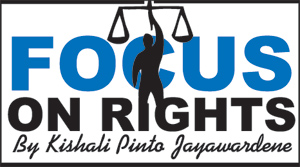No consequential punishments imposed
This by itself is a remarkably understated conclusion given the level of aggravation which occurred, with soldiers chasing and assaulting journalists who were legitimately reporting on the fracas and abusing men and women of the cloth when panic stricken villagers sought shelter in a nearby church. Even so, what has happened in due course?
Reportedly the factory which had allegedly caused the contamination of ground water is due to be shifted but the military command line of responsibility is left unscathed. The public is not even informed of what consequential punishments have been imposed on the soldiers who ‘exceeded the scope of their duties” let alone their superiors who ordered such drastic action purely to demonstrate their power.
Probably if this same incident had occurred in the North/East and Tamil/Muslim villagers had been affected, the factory would have not got shifted, no inquiry would have been held even for cosmetic purposes. Those who protested would perhaps be languishing under the prevention of terrorism laws in some dark prison.
The ambiguous role of the Rule of Law
The Weliweriya incident encapsulates basic questions about the Rule of Law which unfortunately tends to get downplayed each time the sessions on Sri Lanka at the United Nations Human Rights Council (UNHRC) comes round, catapulting the country into what has become a familiar ritual on war crimes and accountability.
In this furore, the Rule of Law comes to occupy a somewhat ambiguous role, being all things to some people and none at all to others. This fundamental lack of unanimity in thinking, in turn, has made effective collective interventions in a way that actually changes government policy, difficult if not impossible. Let us see what some of these differences are.
On the one hand, there appears to be the assumption that talking of the Rule of Law is the ‘easy way out’ which avoids confronting ‘difficult’ questions such as the fate of the thousands of Tamil civilians in 2009. On its own part, (albeit with refreshing exceptions) Tamil political parties are marked in their reluctance to focus on the Rule of Law, preferring instead to talk of the historic grievances of the Tamil people. The Rule of Law, from this point of view, appears to be looked upon as a problem affecting the majority in Sri Lanka with which the minorities need have little empathy.
Needless to say, these are extremely shortsighted views. They are also counter-productive in their essence for they shut out the majority of the country from concerns that are shared in common with the minorities.
The trajectory of the LLRC report
On the other hand, this government has demonstrably little understanding of what the Rule of Law means, even in its most basic sense. Its knee jerk reaction to the 2011 Lessons Learnt and Reconciliation Commission (LLRC) Report which centered on Rule of Law concerns was first to say that the LLRC had exceeded its mandate. Then when the resolution of the United Nations Human Rights Council asking that the LLRC’s recommendations be implemented in 2012 came about, government spokespersons talked of a road map for implementation as if the implementation of the law needed a roadmap!
In fact, the energy that the LLRC report has generated in focusing on a serious Rule of Law crisis is interesting. For perhaps the first time in years, government propaganda that all those who criticize government actions or policy were traitors began to be perceived as distinctly ridiculous. It was soon realized at least domestically that debunking the LLRC report to rely solely on international pressure to bring about a war crimes inquiry beyond Sri Lanka’s shores was shortsighted and, in the long run, dangerous.
Essentially, where a despotic administration blind to all basic norms of internal governance is concerned, international pressure is well and good, perhaps even necessary. But this pressure must always be applied with care and caution so as to avoid giving domestic lift to a political leadership that is able to skillfully use such pressure.
The key to changing Sri Lanka’s pitiless non-accountability culture is in bringing about incremental and not instant change. To do this, public support needs to be garnered, based not merely on pressure from the outside but pressure from the inside.
The issue is not only about the law
So as Sri Lanka goes before the Council yet again, it is quite clear that hard core reforms recommended by the LLRC are yet to be implemented even though we are assured by one Commissioner of the Human Rights Commission (who seems to have taken on the task of chief spokesperson for the government in blatant defiance of his statutory role) that a Right to Information law and a Witness Protection law is on its way. Yet the issue is manifestly not merely about the law. Instead it is about political will in implementing the law. It should be assumed that this is not something that must be peculiarly said. But the sheer asininity of the defences mounted by government defenders provokes such tart responses.
Sri Lanka is an excellent example, in fact, where even good laws have been thrown to the proverbial dustbin. A salutary example is the 1995 Anti-Torture law which now apparently exists only on the statute books. Where are the prosecutions for grave human rights violations and torture that result in actual convictions? Where is the deterrent effect of the law? What is the government’s policy on prosecuting alleged torture perpetrators?
Called to account by the people
The ominous nature of the ‘security state’ that we are inflicted with is now without question. In fact, the Weliweriya incident is the clearest example of this post-war ‘security state’ which has displaced the Rule of Law. It is this fundamental transformation that this Government must be called to account, by the people, quite apart from the annual convulsions at the UNHRC.
– Sunday Times
